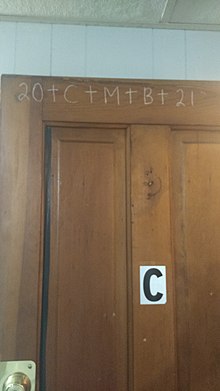

Chalking the door is a Christian Epiphanytide tradition used to bless one's home. [1] The practice of chalking the door originated in medieval Europe, though it has spread worldwide throughout Christendom. [2] [3]


Chalking the door is a Christian Epiphanytide tradition used to bless one's home. [1] The practice of chalking the door originated in medieval Europe, though it has spread worldwide throughout Christendom. [2] [3]
Either on Twelfth Night (5 January), the twelfth day of Christmastide and eve of the feast of the Epiphany, or on Epiphany Day (6 January) itself, many Christians (including Anglicans, Episcopalians, Lutherans, Methodists, Presbyterians and Roman Catholics, among others) write on their doors or lintels with chalk in a pattern such as "20 ✝ C ✝ M ✝ B ✝ 25". The numbers in this example refer to the calendar year 2025 and the crosses to Christ. The letters C, M, and B stand for the traditional names of the biblical Magi (Caspar, Melchior and Balthazar), or alternatively for the Latin blessing Christus mansionem benedicat ('May Christ bless this house'), [4] or IIIK referring to the three kings.
Chalking the door is done most commonly on Epiphany Day itself. However, it can be done on any day of the Epiphany season. [5] In some localities, the chalk used to write the Epiphanytide pattern is blessed by a Christian priest or minister on Epiphany Day, then taken home to write the pattern. [6]
The Christian custom of chalking the door has a biblical precedent as the Israelites in the Old Testament marked their doors in order to be saved from death; likewise, the Epiphanytide practice serves to protect Christian homes from evil spirits until the next Epiphany Day, at which time the custom is repeated. [7] Families also perform this act to represent the hospitality of the Holy Family to the Magi (and all Gentiles); it thus serves as a house blessing to invite the presence of God in one's home. [8] [a]
In 20th century Poland, the practice of chalking the door continued among believers as a way of asserting their Christian identity, despite the Eastern Bloc's state atheism and anti-religious campaigns. [10]

Palm Sunday is the Christian moveable feast that falls on the Sunday before Easter. The feast commemorates Christ's triumphal entry into Jerusalem, an event mentioned in each of the four canonical Gospels. Its name originates from the palm branches waved by the crowd to greet and honor Jesus Christ as he entered the city. Palm Sunday marks the first day of Holy Week; in Western Christianity, this is the beginning of the last week of the solemn season of Lent, preceding Eastertide, while in Eastern Christianity, Holy Week commences after the conclusion of Great Lent.
The liturgical year, also called the church year, Christian year, ecclesiastical calendar, or kalendar, consists of the cycle of liturgical days and seasons that determines when feast days, including celebrations of saints, are to be observed, and which portions of scripture are to be read.

Liturgical colours are specific colours used for vestments and hangings within the context of Christian liturgy. The symbolism of violet, blue, white, green, red, gold, black, rose, and other colours may serve to underline moods appropriate to a season of the liturgical year or may highlight a special occasion.
CMB is the cosmic microwave background, the thermal radiation left over from the time of recombination in Big Bang cosmology.
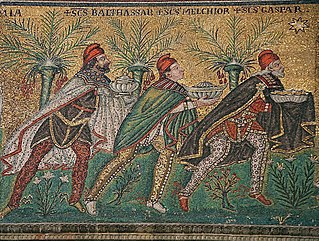
In Christianity, the Biblical Magi, also known as the Three Wise Men, Three Kings, and Three Magi, are distinguished foreigners who visit Jesus after his birth, bearing gifts of gold, frankincense, and myrrh in homage to him. They are commemorated on the feast day of Epiphany—sometimes called "Three Kings Day"—and commonly appear in the nativity celebrations of Christmas.
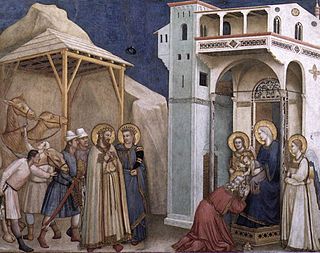
The Twelve Days of Christmas, also known as the Twelve Days of Christmastide, are the festive Christian season celebrating the Nativity.
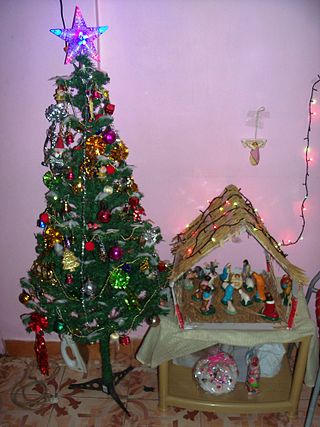
Christmastide, also known as Christide, is a season of the liturgical year in most Christian churches.
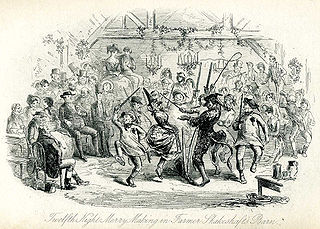
Twelfth Night is a Christian festival on the last night of the Twelve Days of Christmas, marking the coming of the Epiphany. Different traditions mark the date of Twelfth Night as either 5 January or 6 January, depending on whether the counting begins on Christmas Day or 26 December. January 6 is celebrated as the feast of Epiphany, which begins the Epiphanytide season.

Compline, also known as Complin, Night Prayer, or the Prayers at the End of the Day, is the final prayer liturgy of the day in the Christian tradition of canonical hours, which are prayed at fixed prayer times.
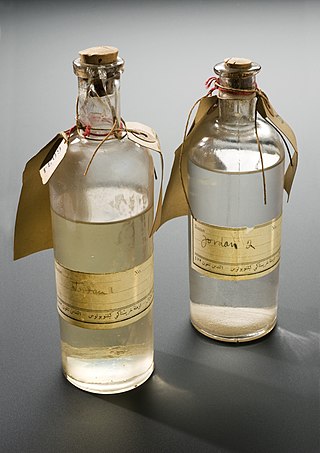
Holy water is water that has been blessed by a member of the clergy or a religious figure, or derived from a well or spring considered holy. The use for cleansing prior to a baptism and spiritual cleansing is common in several religions, from Christianity to Sikhism. The use of holy water as a sacramental for protection against evil is common among Lutherans, Anglicans, Catholics, and Eastern Christians.

The Presentation of Jesus is an early episode in the life of Jesus Christ, describing his presentation at the Temple in Jerusalem. It is celebrated by many churches 40 days after Christmas on Candlemas, or the "Feast of the Presentation of Jesus". The episode is described in chapter 2 of the Gospel of Luke in the New Testament. Within the account, "Luke's narration of the Presentation in the Temple combines the purification rite with the Jewish ceremony of the redemption of the firstborn ."

Epiphany, also known as "Theophany" in Eastern Christian tradition, is a Christian feast day commemorating the visit of the Magi, the baptism of Jesus, and the wedding at Cana.
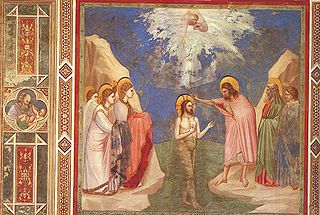
The Feast of the Baptism of the Lord, or Theophany, is the feast day commemorating the baptism of Jesus in the Jordan River by John the Baptist. Originally the baptism of Christ was celebrated on Epiphany, which commemorates the coming of the Magi, the baptism of Christ, and the wedding at Cana. Over time in the West, however, the celebration of the baptism of the Lord came to be commemorated as a distinct feast from Epiphany. It is celebrated in the Catholic Church as well as the Anglican and Lutheran Churches on the first Sunday following The Epiphany of Our Lord. Some Lutheran churches celebrate it on the Sunday before Lent, or Quinquagesima.

The Epiphany season, also known as Epiphanytide or the time of Sundays after Epiphany, is a liturgical period, celebrated by many Christian Churches, which immediately follows the Christmas season. It begins on Epiphany Day, and ends at various points as defined by those denominations. The typical liturgical color for the day of Epiphany is white, and the typical color for Epiphany season is green.

In Christian tradition the churching of women, also known as thanksgiving for the birth or adoption of a child, is the ceremony wherein a blessing is given to mothers after recovery from childbirth. The ceremony includes thanksgiving for the woman's survival of childbirth, and is performed even when the child is stillborn, or has died unbaptized.
House blessings are rites intended to protect the inhabitants of a house or apartment from misfortune, whether before moving into it or to "heal" it after an occurrence. Many religions have house blessings of one form or another.

The Gospel in Christian liturgy refers to a reading from the Gospels used during various religious services, including Mass or Divine Liturgy (Eucharist). In many Christian churches, all present stand when a passage from one of the Gospels is read publicly, and sit when a passage from a different part of the Bible is read. The reading of the Gospels, often contained in a liturgical edition containing only the four Gospels, is traditionally done by a minister, priest or deacon, and in many traditions the Gospel Book is brought into the midst of the congregation to be read.

A watchnight service is a late-night Christian church service. In many different Christian traditions, such as those of Moravians, Methodists, Catholics, Lutherans, Anglicans, Baptists, Adventists and Reformed Christians, watchnight services are held late on New Year's Eve, which is the seventh day of Christmastide. This provides the opportunity for Christians to review the year that has passed and make confession, and then prepare for the year ahead by praying and resolving. The services often include singing, praying, exhorting, preaching, and Holy Communion.

Star singers, also known as Epiphany singers, or Star boys' singing procession (England), are children and young people walking from house to house with a star on a rod and often wearing crowns and dressed in clothes to resemble the Three Magi. The singing processions have their roots in an old medieval ecclesiastical play, centred on the Biblical Magi of the Christmas story in the Gospel of Matthew, appropriate to Epiphany. It is observed usually during the period between 27 December and 6 January.

Among Eastern Orthodox and Eastern-Rite Catholic Christians, holy water is blessed in the church and given to the faithful to drink at home when needed and to bless their homes. In the weeks following the Feast of Epiphany, clergy visit the homes of parishioners and conduct a service of blessing by using the holy water that was blessed on the Feast of Theophany. For baptism, the water is sanctified with a special blessing.